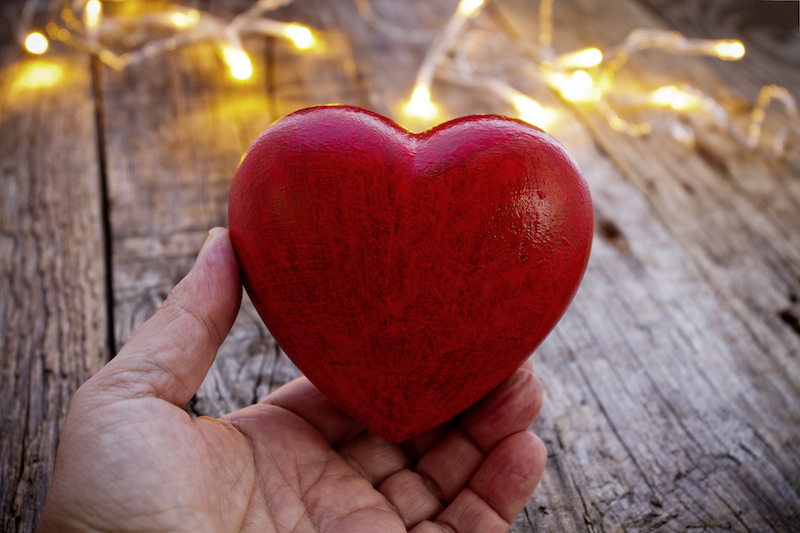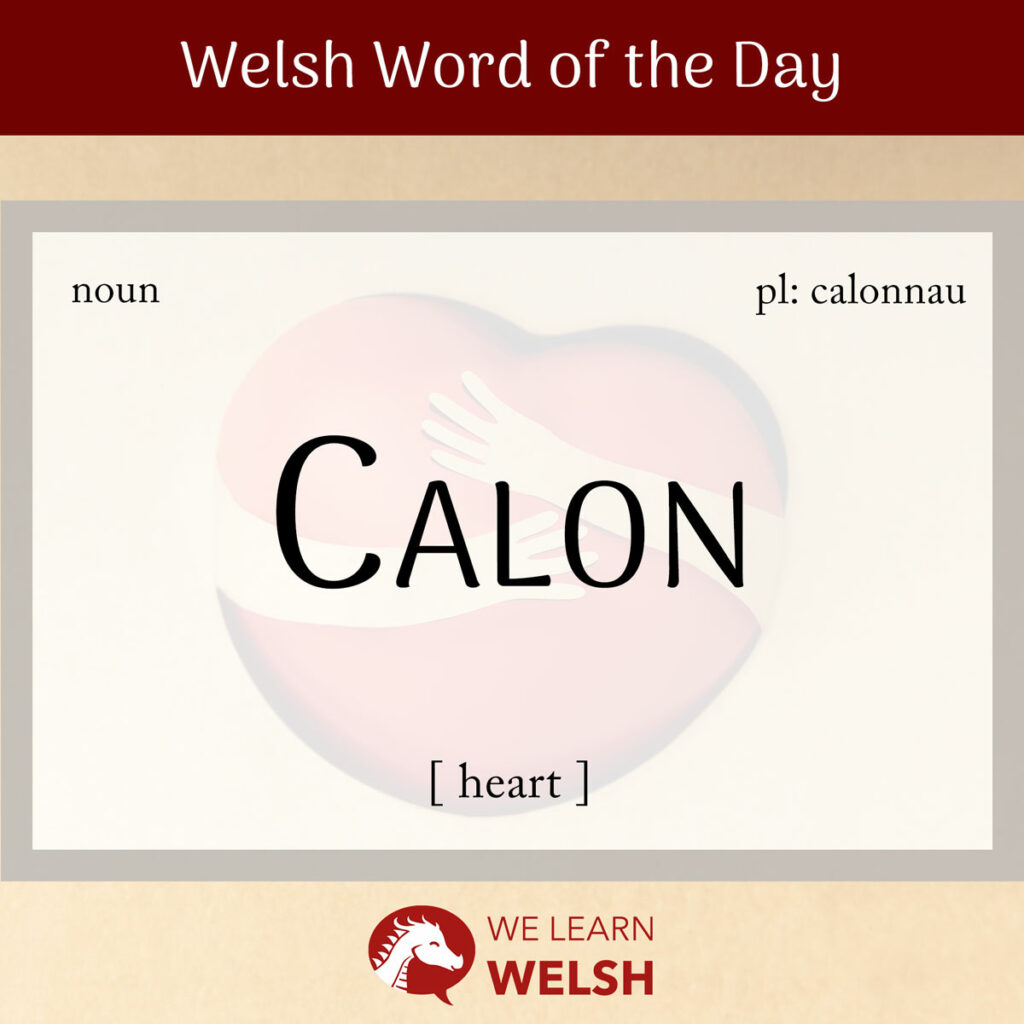Have you ever noticed that the Welsh word calon (heart) is an anagram of the word canol (middle)? It’s a neat coincidence, given that we often symbolically see our calonnau (hearts) as being the centre of the corff (body) and hunaniaeth (identity).
Let’s find out the Welsh vocabulary you’ll need to discuss every aspect of dy galon (your heart) – from how it works, to what it signifies in human culture.
calon
heart
This word comes from the proto-Brythonic *kalwon, also meaning heart. Accordingly, the Breton and Cornish translations are almost identical – kalon in Breton and kolonn in Cornish.
The fact that it begins with a ‘c’ means that it’s subject to soft, nasal, and aspirate mutations.
Soft mutation
galon
Nasal mutation
nghalon
Aspirate mutation
chalon
Dy galon, mentioned above, is a good example of the soft mutation, but there are plenty of other contexts where it does this, too. Since it’s a feminine noun, it becomes y galon (the heart), as feminine nouns mutate after y or yr (the). My heart is fy nghalon and her heart is ei chalon – so you’ll see that with this word, all the mutation possibilities can come up very frequently.
Y galon is the cyhyr (muscle) that pumps gwaed around an animal’s corff. This is done via the system gylchredol (circulatory system).
The organ (organ) itself is made up of four siambrau (chambers) – the atriwm de (right atrium), atriwm chwith (left atrium), fentrigl de (right ventricle) and fentrigl chwith (left ventricle). The gwaed is transported by rhedwelïau (arteries) and gwythiennau (veins).
Because y galon plays such an important role in the body, clefyd y galon (heart disease) is incredibly dangerous. Conditions include:
- traw(i)ad ar y galon = heart attack
- ataliad ar y galon = cardiac arrest
- clefyd rhydwelïau coronaidd = coronary artery disease
- methiant y galon = heart failure
- pwysedd gwaed uchel = high blood pressure
- afreoleidd-dra / arythmia = arrythmia
The risk of most kinds of clefyd y galon can be reduced, although sadly not eliminated, with lifestyle changes like increased ymarfer corff (exercise) and giving up certain habits such as ysmygu (smoking) and eating cig (meat).
But for any more information on the biological side of things, I’m not your person – you’ll have to ask a cardiolegydd (cardiologist). 😉
Mae o’n wan iawn ar ôl cael drawiad ar y galon.
He’s very weak after his heart attack.

Of course, y galon is also a symbol (symbol) with huge importance across communities and cultures, representing cariad (love), trugaredd (compassion) and dewrder (bravery). In fact, in Welsh the word calondid is even considered a synonym for dewrder and gwroldeb (courage).
We use the word calon, as we do heart, to refer figuratively to someone’s innermost self or enaid (soul). In general it’s seen as the centre of things – probably why in Welsh it’s even used to describe the centre of a vegetable or fruit, as in calon afal (an apple core).
Interestingly, this association of the calon with teimladau (emotions) and cydwybod (conscience) has been observed across diwylliannau (cultures).
The Abrahamic crefyddau (religions), Judaism, Christianity, and Islam, describe y galon as the sedd (seat) of logical, emotional, and moral reason in the human corff. Ancient Chinese meddygon (doctors) and mystics believed that the heart was the centre of human gwybyddiaeth (cognition). In ancient Egypt, y galon was viewed as a part of the soul and its heaviness was a measure of an individual’s pechodau (sins) after marwolaeth (death), and predicted their experience of the afterlife.
Outside of religious or spiritual contexts, this association still endures – especially in commercial culture. We depict the calon (heart) in stylised, decorative ways and use its imagery to mark occasions like Dydd Sant Folant (Valentine’s Day) and Dydd Santes Dwynwen (the Welsh equivalent). The language of calonnau is often used to express emotion and desire, particularly of the rhamantus (romantic) variety. Which is why, when a relationship ends, most people are left with a tor calon – a broken heart!
Rwy’n dy garu di â’m holl galon.
I love you with my whole heart.
This is a phenomenon to which the Welsh are no strangers. Take the tradition of the llwy serch / llwy garu (lovespoon) that young men would present to their beloved to demonstrate their practical skills and their serious intentions. These were often decorated with calonnau, as well as other symbols like clochau (bells) to represent marriage and pedolau (horseshoes) for luck.
So, it makes sense that most emotional English heart-related phrases can be translated directly into Welsh:
- calon aur = a heart of gold
- calon garreg = a heart of stone
- calon yn y lle iawn = heart in the right place
- calon yn ei sgidiau = heart in his / her boots
- o waelod fy nghalon = from the bottom of my heart
- agos at fy nghalon = close to my heart
- wrth fodd fy nghalon = after my own heart
- doedd fy ngalon ddim ynddo = my heart wasn’t in it
- caru rhywun â’ch holl galon = to love someone whole-heartedly
- ennill cariad rhywun = to win someone’s heart
- torri calon rhywun = to break someone’s heart
- digalonni = to become dis-heartened
Phew! Plus, we have a few of our own. For example, diolch o galon (thanks from the heart) is a common and meaningful alternative to diolch yn fawr (thanks very much).
The importance of the calon to human selfhood is all too clear when you look at traditional proverbs. For example, take the Welsh saying allwedd calon cwrw da.
Word for word, this translates as “key heart beer good.” But thanks to the conciseness of Welsh grammar, particularly in how possession and identification are expressed, we can interpret it as good beer is the key to the heart. That still leaves us with a bit of a mystery – until we begin to unpack the metaphor!
What this proverb is trying to say that is being drunk will cause people to be much more honest and reveal their secrets and their true self. This only makes sense, of course, if we take for granted the idea that y galon is our true self.
Gwrandewch ar eich calon ac mi fydd popeth yn iawn.
Listen to your heart and everything will be okay.
So we know that the Welsh, the Ancient Egyptians and Chinese, modern Europeans and American, and most world religions are on board. And that’s just the beginning of it – Sanskrit texts, classic Greek, Roman and Arab philosophers, and indigenous communities from North America to Australia, all see y galon as fundamentally central to our hunaniaeth.
Perhaps this seeming global coincidence is because there’s some truth in the idea that the calon is the centre of the self, or at least the emotional self. Many people feel poen (pain) in the chest when they are incredibly trist (sad).
There is even a life-threatening heart condition, called Takotsubo, which is caused by extreme emotional stress. To outsiders, Takotsubo can even appear as if it were a trawiad ar y galon. It’s sometimes called broken-heart syndrome.
Now, there is no way I could finish this article without mentioning Calon Lân (A Pure Heart). This beautiful Welsh emyn (hymn) speaks of the importance over everything of being a virtuous person. The singer asks, presumably of God, to be given a pure, happy and honest calon rather than wealth.
Though the lyrics are religious, the message can ring true for everyone. Here is the first verse and chorus with English translation:
Nid wy’n gofyn bywyd moethus
Aur y byd na’i berlau mân
Gofyn wyf am galon hapus
Calon onest, calon lân
I’m not asking for a luxurious life
The world’s gold or its pearls
I’m asking for a happy heart
An honest heart, a pure heart
Calon lân yn llawn daioni
Tecach yw na’r lili dlos
Dim ond calon lân all ganu
Canu’r dydd a chanu’r nos
A pure heart full of goodness
Is fairer than the pretty lily
Only a pure heart can sing
Sing the day & sing the night
The title of the song is a combination of the word calon with the word glân. In everyday life glân tends to mean clean, but here the idea of cleansing is much less literal. So it’s really best translated as pure – we can understand the meaning as clean as sin. It has also taken a soft mutation, going from glân to lân because of the fact that calon is a feminine noun.
There are a lot of lovely recordings of Calon Lân – plenty by traditional Welsh male voice choirs, and covers by modern pop singers like Cerys Matthews. It was even once performed on Britain’s Got Talent!
And for learners, singing is one of the best ways to connect to the Welsh language, which is musical by nature and by default. It may feel daunting, but humour me. Have a couple of listens to get the hang of the tune, and then have a go at humming the chorus back yourself. Once you’re comfortable with that, you can try singing along using the lyrics written above.
Music – mae’n iechyd i’r galon (it does the heart good)!

